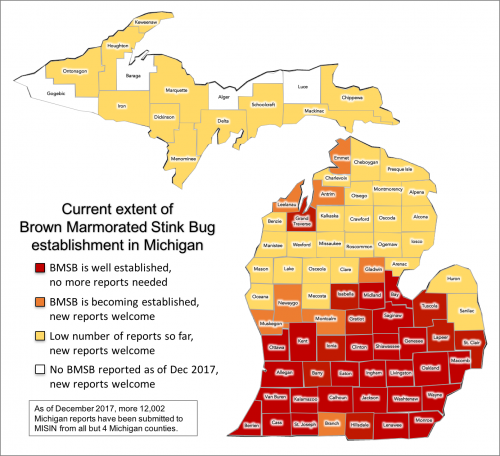Brown marmorated stink bugs are moving into Michigan homes again
What they are, why stink bugs are entering houses, and what you can do about them.

Editor's note: If you have already reported a sighting from a particular address or live within the area where we know BMSB is well-established (see map below), we do not need to hear from you. Thank you for participating!
It’s that time of year again when brown marmorated stink bugs invade structures humans create looking for a place to hunker down for winter. Since last fall when Michigan residents were asked to report brown marmorated stink bugs in their homes, we now know that brown marmorated stink bugs are well-established as a nuisance pest in homes in the southern Lower Peninsula of Michigan.
What are they doing?
Brown marmorated stink bugs are looking for a protected place to hibernate over winter. They will leave your house again in the spring – if they can find their way back out – to look for plants to feed on and lay their eggs outside.
What are they NOT doing?
They are NOT nesting, laying eggs or feeding on anything or anyone in your house. These are plant-feeding insects with straw-like mouthparts for drinking plant juices – they are harmless to humans and pets.
What do you need to do?
- Don’t panic.
- Look for gaps around window air conditioners or holes in window screens and block them off – these are easy access points for brown marmorated stink bugs to enter houses.
- The easiest, non-toxic way to dispose of them is with a couple inches of soapy water in a bucket – the soap prevents them from escaping the water. Sweep them into the bucket and they will drown in the soapy water, which you can then dump outside. Or you can do the same with a Shop-Vac – add the soapy water to the canister before vacuuming them up with the Shop-Vac.
- Report how many you’ve seen at a given location using the Midwest Invasive Species Information Network. If you have trouble registering with MISIN and would like to report a sighting, email Julianna Wilson at jkwilson@msu.edu with your name, address (or nearest crossroads), the date you saw them and how many you have seen. If you have already reported from a particular address or live within the area where we know BMSB is well-established (see map below), we do not need to hear from you.

View larger image. As of December 2017, more than 12,000 reports have been submitted to MISIN from all but five Michigan counties. From these reports, we know BMSB is well-established in counties colored in red (darkest color), and we do not need any more reports if you see BMSB in these areas. Outside of the counties in red, we are interested in hearing where BMSB is being found. Reports should be submitted through the MISIN website.
Biology and other tips for managing them in your home: download the free Brown Marmorated Stink Bug (BMSB): Information for Michigan Residents tip sheet from Michigan State University Extension.
Prevent them from entering your home: see “Managing brown marmorated stink bugs in homes.”
Report sightings of brown marmorated stink bugs: see “Why and how to report sightings of brown marmorated stink bugs in your home or business.”
Visit MSU’s Brown Marmorated Stink Bug website for monitoring network reports and additional information.



 Print
Print Email
Email




